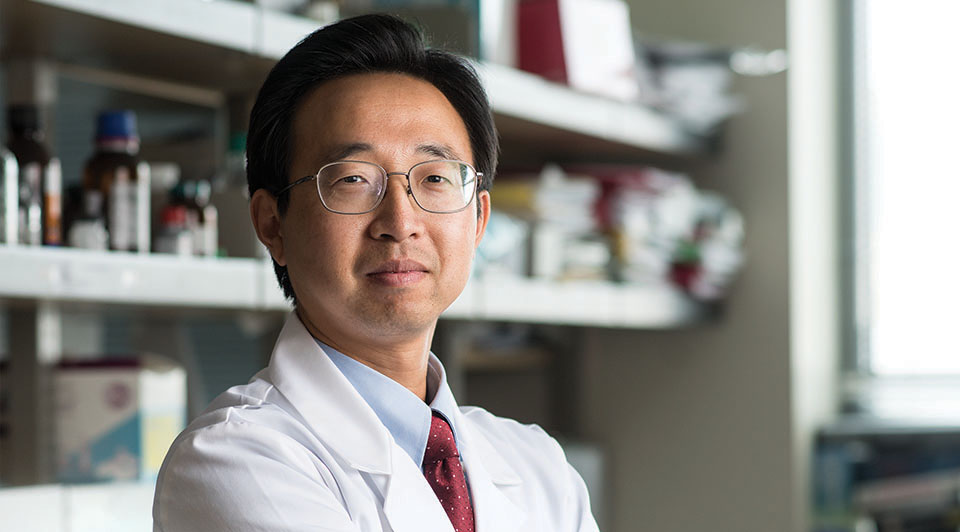As Kun Cheng, Ph.D., works at devising new biotech drugs for breast cancer, he needs no reminder of how profoundly his research might change the lives of ordinary people.
Cheng’s aunt was diagnosed with breast cancer just before he joined the UMKC pharmacy faculty in 2007.
“She was only 50 years old, and my uncle was desperate for any possible treatments,” he says. “That is how I got to know breast cancer and decided to initiate my breast cancer research.”
His aunt survived, but pancreatic cancer killed his father in 2013.
“I have gone through the shock, desperation and sadness as many others who are battling with cancer,” he says. “Therefore, I have a very strong empathy for cancer patients and their family members.”
Cheng, an associate professor, has recently brought the School of Pharmacy $525,000 from the American Cancer Society for breast cancer research and nearly $1.7 million to fight liver fibrosis, a precursor to the often-fatal cirrhosis of the liver.
Central to both projects is a large molecule, or macromolecule, called small interfering RNA (siRNA), which blocks the expression of certain genes — such as cancer-inducing oncogenes — by interfering with the transmission of genetic information in cells.
Cheng calls siRNA “one of the most important findings in biomedical research in the past 18 years.”
“It can specifically and potently block a gene to study its function or treat a disease,” he says.
The potential payoff is huge for cancer patients, who now confront the miserable, even life-threatening, side effects of traditional chemotherapy.
“Many times you have to stop treatment because the side effects are too great,” Cheng says, “but when you stop treatment, the cancer cells come back.”
While siRNA is far less toxic than chemo, it’s of little value to patients by itself. Its large size and negative charge prevent siRNA from efficiently entering cells. And without alterations, Cheng said, it will quickly degrade in the body.
The molecule is so unstable that Cheng’s team, which also includes UMKC faculty members Hari Bhat and Daniel Dim, will store siRNA at -112 degrees Fahrenheit to keep it from breaking down.
Cheng’s goal is to make siRNA more effective and to deliver it more efficiently to tumors while minimizing the harm to healthy tissue.
For breast cancer, Cheng is targeting an oncogene that’s active in about 30 percent of breast cancers. Previously, his team showed that blocking that gene with synthetic siRNA significantly curbed tumor growth in the laboratory and looked promising in rodents.
Now he’s looking at chemical connectors that will bind siRNA with cancer cells and bring the drug deeper into breast tumors. The connectors must drop away, however, once it enters tumor cells.
“That’s challenging,” Cheng says.
siRNA is small as macromolecules go, and Cheng is using small connectors, which not only work better on tumors but also are more conducive to large-scale production by drug companies. If successful, the research holds promise for other malignancies influenced by the same oncogene, including prostate, ovarian and brain cancer.
As for his other major grant work, Cheng began his liver fibrosis research before arriving at UMKC. His latest study targets fibrosis caused by alcohol abuse, which accounts for more than half the cases.
Previously, Cheng and his team proved that alcohol increases the expression of a certain gene in liver cells, and they developed siRNA that silenced that gene and reversed the buildup of a collagen seen in diseased livers.
The next step is to effectively deliver the drug in patients. All fibrosis patients could benefit, whether their disease is caused by alcohol, hepatitis or some other factor, because the same target gene is at work in all.
Curious and scientific, even as a child, Cheng looks forward to how his work can bring hope to individuals and families suffering from the effects of cancer and liver fibrosis.
Risk factors for breast cancer
Cancer risk increases with age
Periods before 12 years old
Menopause after age 55
Overweight
Hormone replacement therapy
Birth control
Alcohol use
First childbirth after age 35
BRCA1 gene
BRCA2 gene
Family history of breast or ovarian cancer
Common causes of liver fibrosis
Chronic hepatitis C
Alcohol-related liver disease
Chronic hepatitus B
Nonalcoholic fatty liver disease and nonalcoholic steatohepatitus

